Newsletters
Our newsletters are sent out the first week of every month for the month ahead and come straight to your email address.
If you are not receiving copies but would like to, please make your FSO or SSW aware or email fostering@nottscc.gov.uk and we can request for you to be added to the list.
Happy reading.
Word of the Month
December's word of the month is Love

Many of us have feared using the world ‘love’ in our professional practice, possibly because of what it may imply. The word love, however, can mean a multitude of things, including working with others in a compassionate and caring way.
We are being given permission to use the word professionally and it is starting to be used in government practice guidance:
On 2 February 2023, the government published a new vision to transform children’s social care: Stable Homes, Built on Love: Implementation strategy.
In December 2023 the government published Working Together to Safeguard Children 2023. On page 7 it states, ‘Every child deserves to grow up in a safe, stable, and loving home’.
In November 2024, the government published Keeping Children Safe, Helping Families Thrive: Breaking down barriers to opportunity, The Rt Hon Bridget Phillipson MP, Secretary of State for Education says ‘I want to build a country where all children grow up with the love, care and support they need to achieve and thrive’ (p3).
Examples:
- I love the care you show to your pet
- I loved your singing in the Christmas Play
- I admire the strength you have shown
- I have great respect for your commitment to your colleagues
- I adore your creativity
Watch an 8 minute video on adopting a loving pedagogy.
November's word of the month is Exit plan

Alternative phrases:
- My/our plan
- My/our future plan
- Our family's support plan
- Plan on how to continue progress
- Moving forward plan
- Sustainability plan
- Plan for using my new skills in the future
- My new chapter plan
When a child, young person or family are due to stop accessing support from a service, they are often provided with a plan of what will happen next. This can sometimes be referred to as an 'exit plan'. This has negative connotations for many of our children, young people and families. They might have been having the support for a number of months and could have found it really helpful or become reliant on it.
When the support from a worker or service is coming to end, and we say their programme or plan of support with us is closing and we are ‘exiting’ their lives, this can create many anxieties in itself - without this use of language. An exit plan may require a lot of commitment from our children, young people and families and may induce an immense amount of pressure to ‘go it alone’. We need to take time to consider the impact it could have. If we can refer to these plans in a more strengths-based way, including the way we communicate about them, and use a trauma-informed lens, we can seek to empower rather than scare.
Exit plans means the work from us is no longer required as the support has been identified elsewhere, whether that is within the children and families themselves, or through another service. Where there is a positive outcome it should be celebrated! While creating these plans we can collaborate, build trust and safety, and empower. The door may not be closed completely, and it might be a great opportunity to mark the progress made.
October's word of the month is Respite
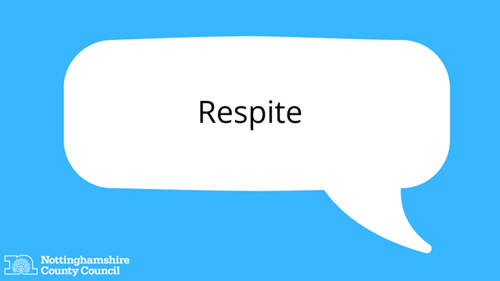
Alternative phrases:
- The young person needs to recuperate after caring for their parent in addition to their other responsibilities
- The young person’s parent needs to take some time for themselves
- The carer needs a period of rest to be able to meet [the person’s] needs fully
- The young person needs time away from their carers for a change of environment
- The young person needs to have new experiences away from the family home
A common definition of respite is ‘a short break from something unpleasant or difficult’. If you are, for example, a young person, someone with a disability, or an older family member, and you know someone who cares for you takes or needs respite, it could suggest to them that they are a burden.
We all need and deserve a period of time to rest and recuperate after we’ve been very busy or worked hard to care for someone else. Only when we have had the time we need can we appropriately care for another person and meet their needs as best we can. It is not the fault of the individual that they require additional care, and they should not be made to feel shame for this.
Other reasons for taking time away can include young people needing a change of environment, or to have new experiences away from the family home.
For example:
Katie needs to take some time to rest and meet her own needs, having spent the last four weeks going to school full time, administering her mum’s medication and supporting her physically while also caring for her little sister.
September's word of the month is Impulsive

Alternative words and phrases:
- The young person may need support in how they express their emotions safely
- The parent/carer can respond quickly to situations because of not understanding their feelings
- The young person has reduced consequential thinking owing to their experience of trauma and can sometimes act quickly
- The children need support in understanding how their behaviour could negatively impact themselves and other people
The word impulsive means to act without prior thought. It can create the belief that someone has the potential to be harmful to others, as they do not consider the consequences of their behaviour for themselves or others.
If we consider behaviour through a trauma-informed lens we can seek to understand why someone may present as acting without thought and allow them opportunities to understand their feelings and learn ways to express them in a helpful way. If we can describe the behaviours taking place and any known circumstances that could lead to that behaviour, it would allow a strength-based view on how we can use already held skills and interests to create positive change.
For example:
Charlie acts impulsively whenever there is a cover teacher.
Charlie experiences difficulties in concentration when he is not taught by his usual teachers, owing to needing time to build trust in new adults. He needs help to prepare for classes when there is a cover teacher. Where preparation can’t take place in advance, it helps if he is introduced by a trusted adult.
August's word of the month is Vulnerable
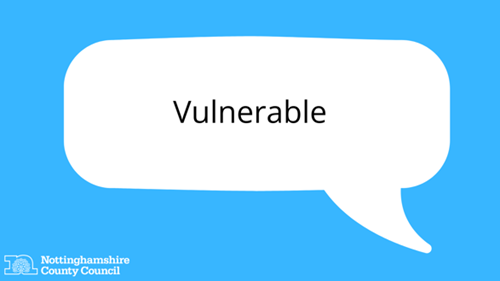
Alternative words or phrases:
- The young person is being placed in an unsafe environment.
- Owing to unmet needs, the young person is at an increased risk of harm.
- Owing to their experiences, the parent is more susceptible to harm.
Using the word to describe the situation rather than the individual:
- The young person/carer is in a vulnerable situation.
The word vulnerable is vague, it does not provide any information about a person or their situation. The word can be dehumanising, stigmatising, and excluding. Referring to someone as vulnerable could imply a power imbalance. It can create division and distance, a sense of 'us and them'. It could suggest the person is weak, that they are flawed and responsible for their circumstances. If the language is changed to being strengths-based, and a trauma informed lens used, it would be more evident that it is the situation making the person vulnerable.
Too much focus is on the individual, rather than what can be done to remove potential threats to their safety. Categorising someone as vulnerable can put them at a disadvantage, implying they need to be saved or rescued. We should instead focus on the strengths as a means of increasing safety. An individual may be aware of the risks to their safety but may not consider themselves to be vulnerable. It could also be helpful to consider what more we can do to break down barriers to promote inclusion and encourage people to ask for help.
July's word of the month is Complex Case
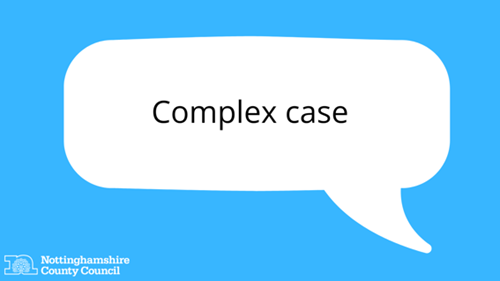
Alternative words or phrases:
- The family/child/carer with multi-needs
- the child/carer has/family have a number of needs
As human beings we are all unique, diverse, and complex. Complex is a vague term as it does not provide any specific detail. The term ‘toxic trio’ is also sometimes used to describe families with co-existing concerns. Referring to another person or a family as complex, or using the term ‘toxic trio’, could induce feelings of shame and hopelessness, and for others could create confusion and anxiety. The word toxic is a very powerfully emotive word that contains stigmas. Using this language can lead to unconscious bias that the person or people will be challenging to work with and have needs that are difficult to understand.
By using a trauma informed lens, we can seek to understand what has been shared with us and for what reasons, in a way that reduces negative judgment. Using uncomplicated language, and identifying specific needs, we can simplify the way that what we write and say is received, reducing the potential for unconscious bias.
Read more on the NSPCC Learning website about how the term 'toxic trio' is unhelpful and inaccurate.
June's word of the month is Alleged

Alternative words and phrases:
- The young person has said...
- The parent has bravely told us that...
- The carer says...
Children and young people do not allege, report, disclose or claim (unless these terms are being used in a specific context, for example, a criminal court hearing). They ‘tell’ us things, they ‘say’ things, they verbalise and act out their thoughts in the only way they know how. Feedback from professionals, such as Police colleagues, has prompted us to consider the use of such words, and the profound impact they can have on the future of children, young people and families moving forward. These words are commonly associated with ‘no evidence’, ‘false accusations’, and can cause others to discredit what has been said.
By using a trauma informed lens, we can seek to understand what has been said to us and for what reasons, in a way that reduces negative judgment. Using uncomplicated language, we can simplify the way that what we write and say is received, reducing the potential for unconscious bias.
May's word of the month is Abscond
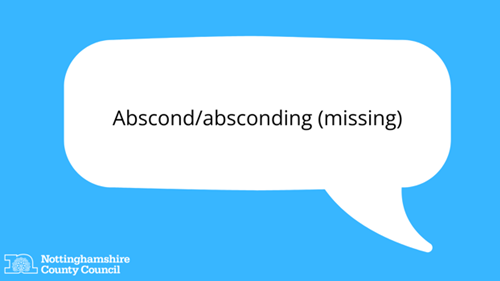
Alternative words and phrases:
- The young person often visits places where they feel safer
- The young person is not currently where they are expected to be
- The young person often leaves home when they feel unsafe
- The young person is believed to be at risk of... because they are not at home
- The young person may be being coerced into being somewhere they do not choose to be
To abscond usually means to leave premises without permission or the knowledge of those in authority. Children and young people may not be where they are expected to be for a wide variety of reasons. The young person may not feel safe at home and has visited a friend, or another relative. The term implies that there are risks associated with them not being present at their expected location, where the reality could be that the risks may be reduced.
The young person may be being exploited into being somewhere else – a situation over which they have no or very little control. This could involve being ordered to look after drugs and weapons, with threats to harm their family if they do not. Absconding suggests the young person does have control over their decision-making and that they are wilfully not being cooperative.
Through using a trauma-informed lens we can seek to understand the child’s story, we can be more specific about why they may not be home when they are expected to be, and thus address any risk/s more efficiently. Providing a context also reduces the risk of creating unconscious bias.
April's word of the month is Defiant
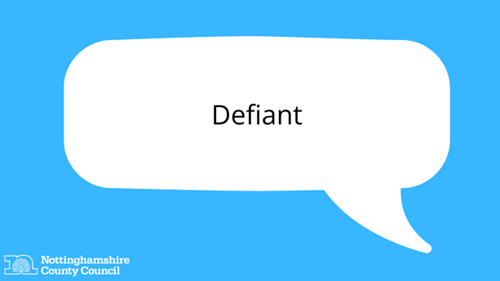
Alternative words and phrases:
- The young person is unable to cooperate with expectations as they have … (anxiety)
- The family are not clear on what is expected of them, and they are therefore unable to do what has been asked
- The parent needs to build trust in order to work positively with us
- The child’s behaviour around this is possibly a sign that there are unmet needs
- The young person’s resistance to this could suggest they find it difficult and need further support
To be defiant or to behave defiantly is a strong statement. It can create negative beliefs and feelings within people around what it means, as it is a vague term that does not give any context or explanation. It can suggest someone is being obstinate, resistant, aggressive, confrontational, and non-compliant.
Using a trauma-informed lens we can seek to explain why someone may be behaving in a way that some may consider defiant. This will allow us to understand their story and any barriers they may be facing, allowing us to explore these in a strengths-based way.
March's word of the month is Attention Seeking

Alternative words and phrases:
- In need of attention/attachment/connection
- Seeking to have needs met
- Has unmet needs
- Communicating that they need help
- Seeking help to regulate
- Needing to feel seen and heard
The need for attention is a natural human instinct. On occasion we seek reassurance through our behaviour that others are there for us. For some this behaviour is a communication to others that something isn’t right, and they need us to notice what is happening and to help them. This is particularly important for children as they are most dependent on adults to meet their needs.
Labelling someone’s behaviour as attention-seeking invalidates their feelings and thoughts, and minimises their needs. If this behaviour is dismissed the needs will remain unmet and the difficulties for them will likely increase. It is acknowledged that occasionally this behaviour is not understood, and the best way to respond to it is not always known. Using a trauma-informed lens we can seek to better understand their story and the reasons our attention is needed.
February's word of the month is Full Potential

Alternative words and phrases:
- Becoming the best you can be; being the best version of yourself; living a healthy and happy life
- I will support you to achieve your goals
- I will encourage you to develop your abilities and creativity
- I will support you to have every chance to achieve your goals
- We will find opportunities for you to live a healthy and happy life
- We will explore any internal obstacles to you achieving your goals
- We will find opportunities for you to develop your skills and experiences
- We will make sure you have every chance to achieve your dreams
While striving to achieve ‘full potential’ is a great aspiration, it is often misunderstood or laden with expectations that are unknown. It is abstract and unmeasurable, so what does it actually mean? It could suggest an unreachable standard, setting people up for perceived failure. Aiming to be the most authentic or best version of yourself is more realistic and more attainable. We could instead seek to develop a positive sense of identity, self-acceptance, strengths, skills, mindset, creativity, and increase positive experiences. Rather than aiming to support someone to achieve their full potential, we could outline specific strengths-based goals that would more likely provide a sense of accomplishment and allow a more concrete outcome to be celebrated.
January's word of the month is Challenging Behaviour
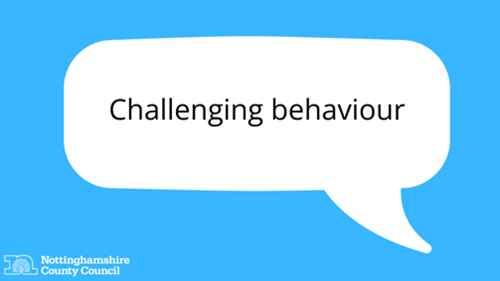
Alternative words and phrases:
- The young person is finding it hard to express their feelings (carer, parent, child, family)
- The child needs support in understanding their emotions
- The parent needs support in asking for what they need
- The carer has distressing feelings and is unable to explain what they need
Behaviour is a form of communication and can represent unmet needs. Using a trauma-informed lens we can seek to understand why someone may act with behaviour that appears to be difficult for us or others to manage. As workers we need to understand that someone may not have learned how to understand their feelings, or ways to cope with their feelings. This kind of behaviour may indicate that someone needs help and support, or that they do not agree with decisions being made about them, for them, or to them.
Rather than using the term ‘challenging’ it would be helpful to identify the specific behaviours present, any recognisable emotions, and the context. This will allow a deeper understanding, and compassion. Using a strengths-based approach, the focus could then be on the interests or skills that the person has, to support them appropriately and meet their needs in a way that is meaningful to them.
Video from Inclusion BC titled Reframing Challenging Behaviour in our Schools






